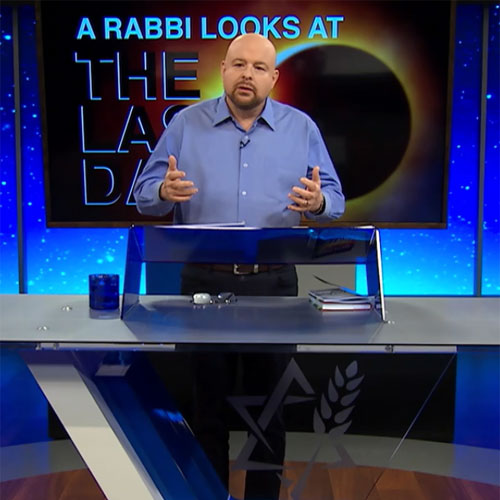Gordon Robertson and Pastor Jobst Bittner | Israel & the March of Life


No one claimed responsibility at the time of the attack, but the world suspected Israel.
Sure enough, just last week – more than a decade later – Israel fessed up.
Defense Forces Chief of Staff Lt. Gen. Gadi Eisenkot said, “Israel will never accept an existential threat against it. That was the message in 2007, and that is the message to our enemies in both the near and distant future.”
The Strike Thwarted ISIS Nuclear Capabilities
Emphasizing Eisenkot’s resolve, the terror group ISIS overran Syria in 2011. From 2014 until 2017, ISIS maintained control of the area once housing the reactor. Many believe Israel’s strike saved the world from a nuclear ISIS, which could have spread its destruction worldwide by cooking up dirty bombs.
“When faced with today’s reality, the decision to destroy the reactor is one of the best decisions made in Israel over the past 70 years,” said Lt. Gen. Amikam Norkin, commander of the Israeli Air Force (IAF). “The principles according to which the IAF prepared for the attack are also the IAF’s principles today.”
The North Korea Connection
Important questions remain unanswered. Who has been hiding those missing al-Kibar nuclear materials all this time? Why did Israel claim responsibility for the attack 10 years later?
Many eyes have turned toward North Korea.
According to the Jewish Policy Center, “Post-attack analysis highlighted North Korea’s connection to al-Kibar.” They noted troubling similarities between the Syrian facility and North Korea’s reactor in Yongbyon.
Hours after Israel acknowledged the attack, a Washington-based think tank inserted alarming speculation into the conversation. The Institute for Science and International Security released a report urging an investigation into a 2015 article in Germany’s weekly news magazine Der Spiegel.
Der Spiegel’s editorial claimed that North Korea helped Syria hide the equipment and materials from al-Kibar. Further, North Korea may be helping Syria construct an underground nuclear reactor that intelligence officials believe they discovered.
The report went on to suggest an Iranian connection to this new nuclear base.
Life in a Horrible Neighborhood
Israelis daily face conditions that many in the U.S. can’t imagine. These include constant threats of terrorism, radical Islam, and impending war on all borders. Now, several enemies either have or soon could have nuclear weapons capable of raining devastation on any Israeli city.
In fact, Prime Minister Benjamin Netanyahu, during an interview with an American radio host, acknowledged that Israelis live in a “horrible neighborhood.”
Despite the chaos that surrounds Israel, the United Nations Sustainable Development Solutions Network recently ranked it the 11th happiest country in the world for the fifth year in a row. The survey asks citizens of each country questions related to their quality of life.
“Israel … is beating most of the Western countries,” said Netanyahu. The poll attributed the high ranking to several factors, including that Russian immigrants in Israel live a happier and better life than before. Additionally, answers revealed that Israel’s youth “have a real confidence in the future.”
While Israel lagged the top 3 happiest countries of Norway, Switzerland and Canada, it outperformed the United States, which placed 18th in the study, released last week and officially called the World Happiness Report.
By comparison, the Palestinian territories didn’t crack the top 100, ranking only 104th on the happiness scale. Syria was the least happy place in the Middle East, checking in at 150 on the list of 156 countries worldwide.
How You Can Pray
There is no doubt that Israel is surrounded by countries striving to annihilate her. Please pray for peace and protection for the Jewish people, who strive to maintain a brave and positive attitude.
Praise God for:
Pray for:
Right now, Jerusalem is on high alert as Passover begins. The two recent terror attacks in Meyo Dotan and Jerusalem’s Old City – which claimed the lives of three Israelis – along with Hamas’ just-announced plan for a six-week, 100,000-person demonstration on the Gaza Strip border, have defense forces across the country and Border Police out in force. As always, pray for the Peace of Jerusalem, but especially during this time of heightened concern.
How Your Gifts Help
As a token of our appreciation for your gift of $40 or more today, we’ll send you the special study guide package for Jonathan Bernis’ newest book, Unlocking the Prophetic Mysteries of Israel. This includes the study guide book, plus the companion 7-disc DVD set. In this set, you’ll move to the next level with study material not found in the book, including why End Times’ prophecy can only be understood in the context of Israel and the Jewish people.

Moses kept pressing Pharaoh to let the Jewish people go, and each time Pharaoh refused, Adonai subjected Egypt to another plague. As the last and worst calamity was near, God informed the Hebrew slaves what to do to escape it.
The Angel of Death would descend upon the land and take Egypt’s firstborn, both human and animal. Each household of Israel was to select an unblemished lamb, care for it four days, and then sacrifice it. They were to paint its blood on the lintel and doorposts of their homes and, by this, the coming death would pass over their households.
“The blood will be a sign for you on the houses where you are. When I see the blood, I will pass over you. So there will be no plague among you to destroy you when I strike the land of Egypt.”
―Exodus 12:13
It was a great and mighty miracle of salvation. The lamb’s death, and its blood as a covering, saved the Jewish people in Egypt. In the New Covenant, John the Immerser identified Yeshua (Jesus) as the Lamb of God (John 1:29), and the apostle Paul refers to Him as our Passover Lamb.
“…for Messiah, our Passover Lamb, has been sacrificed.”
―1 Corinthians 5:7
Yeshua died to offer His blood as a covering for our sin. When God looks at those who have placed their faith in Him, He sees the righteous, shed blood of Jesus, and He spares us from spiritual death. Instead of an eternity apart from Him, we now have eternal life. Yeshua, our Passover Lamb, secured our salvation and gave us abundant life.
“For God so loved the world that He gave His one and only Son, that whoever believes in Him shall not perish but have eternal life.”
―John 3:16
“I have come that they might have life, and have it abundantly!”
―John 10:10
God commanded the Children of Israel to remember the Passover throughout their generations. Passover reminds us to look back at how God met the needs of the Israelites in the wilderness, and it invites us to consider afresh what He has done for us individually. As you go through this daily Passover devotional series, you’ll be encouraged to ponder various ways God has provided for you and to make note of them. Each day, you’ll add to a collection of blessings you can review in the future to refresh and strengthen your faith.
Take some time on this first day of Passover to reflect on the gift of Yeshua’s sacrifice on your behalf. Consider the promise of Heaven, bought for you by His shed blood, and how that encourages you today. Think also of the gift of new life He has given you to enjoy now on Earth. How has He enriched your life?
This enlightening infographic will teach you the meaning of the Passover seder plate, the elements to include and the significance behind them.

Those words are so precious to me. The Lord used them when I was a teenager to give me the revelation that, through the shedding and presentation of His blood, Yeshua (Jesus) – the Lamb of God – fulfilled all God’s righteous requirements in relation to my sin. And God was satisfied. There was nothing more I needed to do but believe it and trust in Him for my salvation.
That Scripture comes from the account of God’s deliverance of the Children of Israel from Pharaoh, their cruel taskmaster. That event itself and its commemoration every year became known as “Passover,” a direct reference to that verse. As Jewish people worldwide pause to observe Passover (Friday evening, March 30 – Saturday evening, April 7, 2018), we have a prime opportunity to intercede for their present-day salvation and deliverance from forces and opposition against them.
As this email is sent out, we at Jewish Voice are in the midst of a week of prayer and fasting. Will you pray for the Lord to meet with us? And during this Passover season, will you join us in praying for the deliverance of the Jewish people in Israel and around the world?
Pray that unsaved Jewish people everywhere will be delivered from:
And delivered into:
Lord, it is hard to realize that many Jewish people no longer observe Passover. Of those who do, it saddens us that most cannot see it is a prophetic revelation of their Deliverer, Yeshua. Abba, please remove the spiritual blindness so that they would see that the sacrifice of Yeshua covers the sin of all who believe and receive Him. May they be delivered into salvation by Your mighty hand and outstretched arm. In Yeshua’s name, AMEN.
Thank you again for your faithful prayers,
Paula
Prayer Center Coordinator


Messianic Jews view New Covenant faith in Yeshua through a Hebraic lens. Such an understanding reveals a marvelous continuity in the whole of God’s Word spanning from Old to New Covenants. Yeshua (Jesus) died at Passover, and He rose on the Feast of Firstfruits. Messianic Jews understand that this is more than coincidence; it’s God’s sovereign design.
Passover is the commemoration of God’s deliverance of the Hebrew slaves in Egypt. Each time Pharaoh refused to let the Children of Israel go, God sent a calamity on Egypt. The 10th and final plague was the worst: the death of the firstborn. God told the Hebrews what they must do to save their firstborn. They were to sacrifice an unblemished lamb and spread its blood on the doorframes of their houses. When the angel of death came upon Egypt, he would pass over every home under the covering of the blood, and spare the firstborn. God reached into human history and delivered the Jewish people from their bondage to Egypt, setting them free to live as a people and nation unto Him.
The Feast of Firstfruits was an agricultural observance a few days after Passover in which the Israelites brought the first of their spring barley harvest as an offering to God. They were not allowed to eat of the harvest until the very first had been offered to God.
Each of the biblical Feasts of Israel established by God in Leviticus chapter 23 has layers of meaning. Many of the Feasts are commemorative, honoring God’s provision and gifts in Israel’s history, and God commanded that they be observed throughout the generations. Within each Feast is also a prophetic foreshadow of God’s future redemptive plan.
The Feast of Passover contains a shadow of Yeshua’s sacrificial death. Yeshua fulfilled the imagery contained in Passover when He shed His blood to cover our sins. He fulfilled the prophetic picture of Firstfruits when He rose from the dead, the first of the resurrection that will be completed in the Last Days when the dead in Messiah will rise. Thus, Jesus is our Passover Lamb and the firstfruits of the resurrection from the dead.
“For Messiah, our Passover Lamb, has been sacrificed.”
―1 Corinthians 5:7
“But now Messiah has been raised from the dead, the firstfruits of those who have fallen asleep.”
―1 Corinthians 15:20
For this reason, Messianic Jews celebrate the resurrection of Yeshua during the Feast of Passover.
So, if Jesus died on Passover and rose on Firstfruits, how did we get Easter?
Jesus’ first followers were Jewish and considered members of a sect within Judaism. But by the fourth century A.D., most of “the Church” was composed of Gentiles and had become infected with anti-Semitic attitudes. In 325 A.D., the Council of Nicea concluded with a letter to the Emperor declaring – in remarkably malicious language – that they wanted nothing to do with the Jewish people.
Though the resurrection occurred on the Sunday following Passover, the Council abandoned the Jewish religious calendar for a new “Christian” calendar built on the Gregorian system. The group declared the resurrection would be celebrated the first Sunday after the new moon following the Spring Equinox. It adopted the date of an existing pagan holiday to the goddess Ishtar and separated the Messiah’s death and resurrection from the Jewish origins of Passover and Firstfruits.
The detachment obscured the intentional correlation designed by God to reveal His redemptive thread connecting Old and New Covenants. The Council overlooked that the Gospel was “for the Jew first” (Romans 1:16) and that Gentiles are grafted in to the covenant God made with the Jewish people (Romans 11) through Yeshua. The decision shows just how soon in history the Church let the apostle Paul’s words fade from their understanding.
For Messianic Jews, the death and resurrection of Jesus are inseparably tied to Passover week. So, while you won’t find Messianic Jewish congregations celebrating Easter, you will find them worshipping the Messiah Yeshua each Shabbat (Shah-BAHT), or Sabbath. And at Passover, Messianic Jews commemorate the biblical Feast commanded by God along with its prophetic fulfillment in Yeshua’s death and resurrection to deliver us from our bondage to sin and free us to eternal life.
This enlightening infographic will teach you the meaning of the Passover seder plate, the elements to include and the significance behind them.
In 1948, the United Nations granted a portion of Israel’s historical homeland for the re-establishment of a Jewish nation. Immediately, nearby Arab nations expelled all Jewish people and collaborated to attack the new nation of Israel.
Arab countries stripped some 800,000 Jewish people of their citizenship, confiscated their property and forced them to leave Jewish communities that predated Arab occupation in the Middle East. The evicted Jewish people fled to Israel, the United States and other countries that absorbed them as citizens.
Meanwhile, Israel had offered citizenship to the Palestinian Arabs living in the region. Roughly 160,000 Arabs accepted. But when Arab nations launched their assault on the hours-old nation of Israel, 700,000 Palestinians left and became refugees. Some departed because of the war, but others were told by the Arab nations to leave the region. The plan was to quickly destroy the new Jewish State and then all the Palestinian refugees could return to their homes. But that victory never came, and Israel stands today.
Instead of absorbing the Palestinians as citizens, these Arab nations received them into refugee camps and enacted laws that continue to:
Deny Palestinian refugees citizenship (except for Jordan)
Bar them from entering many professions
Restrict their land ownership and free movement, and
Deny them education and health services
While more than 1.6 million Arabs enjoy full citizenship and equal rights in Israel today, Palestinians living as refugees in Arab nations have endured decades of poverty. Sir Alexander Galloway, former UNWRA director in Jordan, wrote plainly on the matter in 1952. He said, “The Arab nations do not want to solve the Arab refugee problem. They want to keep it an open sore … as a weapon against Israel” (The Truth about the Refugees).
This remains true 70 years after statehood was established. Palestinian refugees could be citizens of Arab nations or Israel today if not for the overriding goal of destroying the Jewish State.
But who exactly is a Palestinian refugee? The United Nations defines them differently than any other refugee on earth.
In 1949, the U.N. created UNWRA, the United Nations Relief and Works Agency for Palestine Refugees in the Near East. A year later came the UNHRC, the United Nations High Commissioner for Refugees, to address the needs of all other refugees in the world. The two agencies have remained separate with distinct definitions and guidelines. For instance:
THE UNHCR helps worldwide refugees return to their home nation if that’s possible. UNWRA does not assist Palestinians in this way.
When it’s not possible for refugees to return home, the UNHCR encourages them to resettle in other countries. UNWRA does not encourage Palestinian refugees to do so.
According to the UNHRC, a person loses refugee status when he or she becomes a citizen of another country. Palestinian refugees, according to UNWRA rules, retain their refugee status even after receiving citizenship and assimilating into another nation.
Under the UNHRC, refugee status does not extend to future generations – over time, decreasing the population of those considered refugees. According to UNWRA, Palestinian refugee status transfers to children of the original refugees – and all future generations. It is a definition exclusive to the Palestinians, making them the only refugee status that is inherited, and the only refugee population that is increasing.
As long as someone is a descendant of at least one original Palestinian refugee, he or she is considered a refugee even if born and raised in another country. Daniel Pomerantz, Senior Editor of Honest Reporting, points out that, under this definition, even the famous and wealthy fashion model Gigi Hadid, who was born and raised in L.A., is a “refugee.”
Using the UNWRA definition, there is a shocking number – 5 million Palestinian refugees in the world today. However, a report conducted in 2012 by the United States Senate reveals that, if the same definitions used by international law and the UNHRC are applied, there are only 30,000 actual Palestinian refugees (Honest Reporting).
To be sure, those true refugees living in Arab nations suffer under the oppressive laws designed to perpetuate blame against Israel. Today, the hatred remains alive among Arab countries and especially among the Palestinians who continue to incite violence against Israelis.
Despite this, a survey conducted in September 2017 reveals that 63% of Arab citizens in Israel today acknowledge it is a positive place to live. Many also responded favorably saying that the country provides a strong sense of personal freedom and stability (Jerusalem Post).
When President Trump advised the U.N. that he would reduce funds to UNWRA, news reports circulated that Israeli Prime Minister Netanyahu quietly tried to persuade him to reconsider. The U.S. cited legitimate reasons for withholding funding, including that the Palestinians continue to obstruct peace efforts while funding terror with foreign aid.
Some reports have indicated that Netanyahu encouraged Trump to transfer the funds from UNWRA to the UNHCR. Why?
In 1974, the Israeli Supreme Court declared that – whether or not it agrees with the accusation that Israel is an “occupation" – the Jewish State must follow international laws related to occupation. That means Israel is obligated to provide Palestinians with such things as welfare, education, health, transportation and more. Currently, these are subsidized by foreign aid and international relief organizations like UNWRA. If this aid were to dry up today, Israel would bear the full obligation.
It’s a difficult and complex matter. But the next time you hear the staggering 5 million figure applied to Palestinian refugees, you’ll know it also includes full-fledged citizens of other countries who may have never set foot in the Middle East. When next you hear about the Palestinian refugee “problem,” you will know that the issue is real for approximately 30,000 people who need our prayers.
And you’ll know that the matter could have been resolved seven decades ago, if only the refugees had been met with open arms rather than a ploy to use them to spread hatred even now toward Israel today..
Download this free devotional and discover 9 ways you can pray for Israel and the Jewish people worldwide during these critical times.
